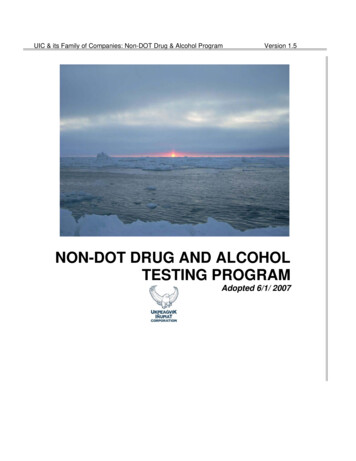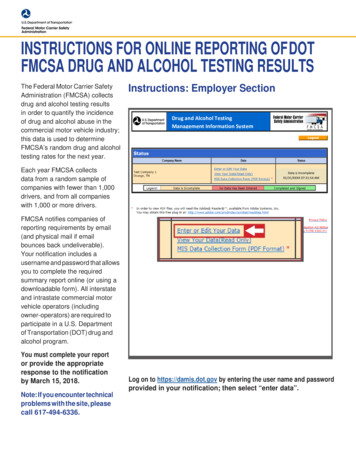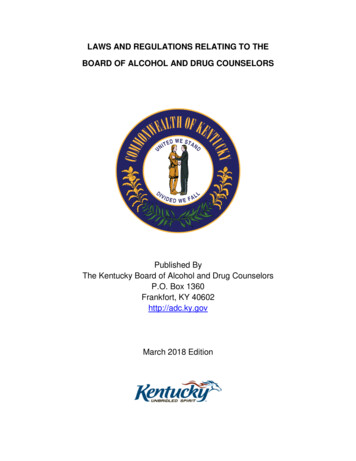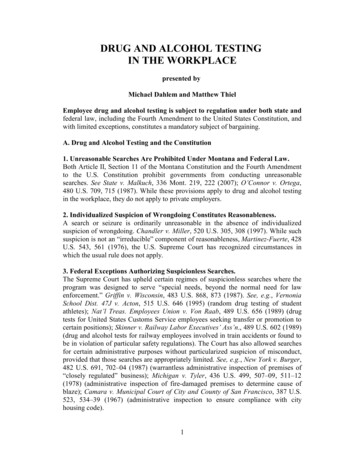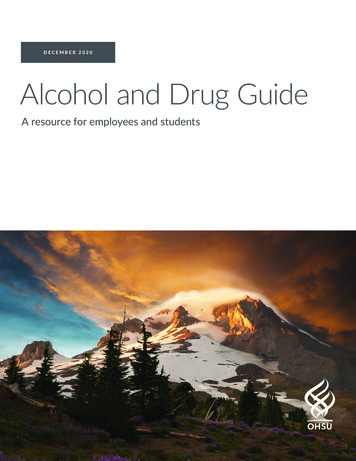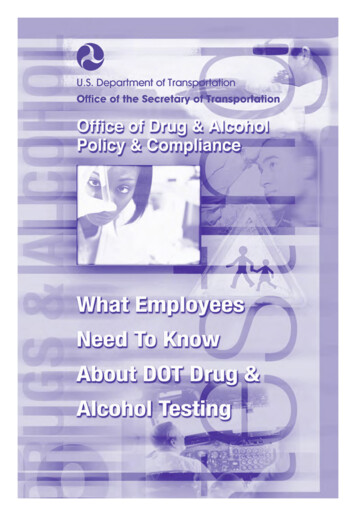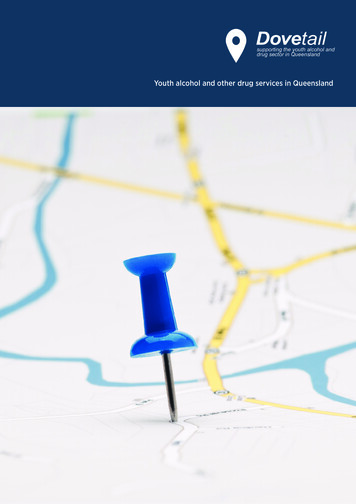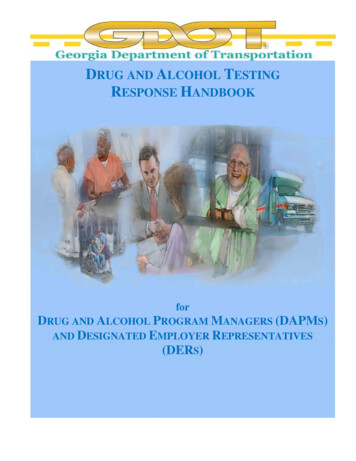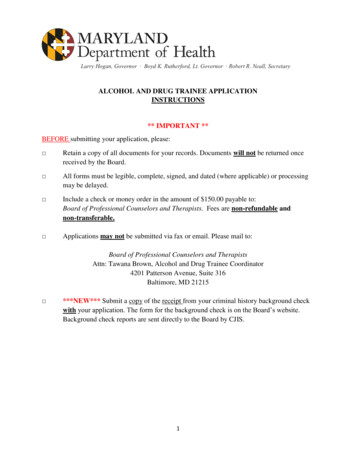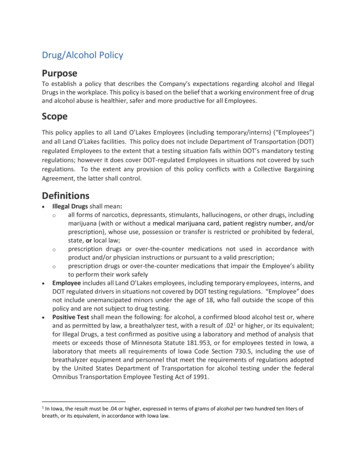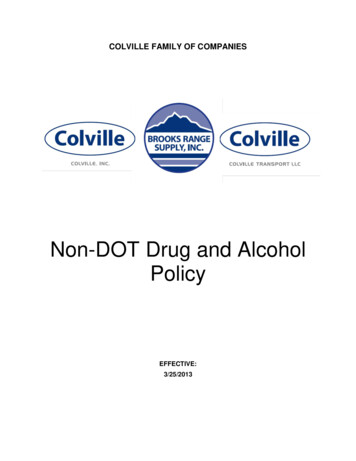
Transcription
COLVILLE FAMILY OF COMPANIESNon-DOT Drug and AlcoholPolicyEFFECTIVE:3/25/2013
Drug & Alcohol Policy and Procedures ManualEffective March 25 2013TABLE OF CONTENTSSECTION I - INTRODUCTION AND GENERAL INFORMATIONA.B.C.D.E.D.Drug and Alcohol Prohibition PolicyEffective Date of PolicyApplicabilityCircumstances Under Which Testing May Be ConductedSearch of PropertySearch of EmployeeSECTION II - CONSEQUENCES OF VIOLATING POLICYA.B.C.D.GeneralViolations and DisciplineDisposal of Items Found in a SearchRequirements for Return-To-DutySECTION III - SAMPLE COLLECTION AND TESTING PROCEDURESA. Collection of SamplesB. Testing ProceduresC. Review of Drug Testing ResultsSECTION IV - EMPLOYEE ASSISTANCE PROGRAM (EAP)A. Scope of ProgramB. Supervisory TrainingSECTION V - CONFIDENTIALITY OF RESULTSA. GeneralSECTION VI - DEFINITIONS2
Drug & Alcohol Policy and Procedures ManualEffective March 25 2013DRUG AND ALCOHOL POLICYSECTION I. INTRODUCTION AND GENERAL INFORMATIONA.Drug and Alcohol Prohibition Policy1.Policy. Colville has a long-standing commitment to maintain the highest standardspossible for the health and safety of its employees, customers, clients, and the public atlarge. The use of or impairment by drugs and/or alcohol during work time is contrary tothese high standards and will not be tolerated.2.Purpose. The purpose of this Drug and Alcohol Policy ("Policy") is to maintain thehighest safety, health, and work performance standards possible, and to reduce workrelated accidents, injuries, and damage which may be caused by drug or alcohol use orimpairment. This policy is also intended to ensure the maintenance of productivity, thequality of products and services, and the security of property.3.Prohibited Conduct. The following conduct is prohibited, and may result in discipline, upto and including dismissal:a.The unauthorized use, possession, manufacture, distribution or sale of an illegaldrug, controlled substance or drug paraphernalia on or in Company-ownedproperty (including Company-supplied vehicles) or while on Company business,or during working hours.b.Storing any illegal drug, drug paraphernalia, or any controlled substance whoseuse is unauthorized, in or on Company-owned or supplied property (includingvehicles).c.Reporting to work, working, or acting or appearing on behalf of the Companywhile under the influence of illegal drugs or a controlled substance whose use isunauthorized.d.Failing to notify the employee's supervisor before beginning work that theemployee is taking medications or drugs which may interfere with the safe andeffective performance of duties. [ NOTE: In November 1998, Alaskan votersapproved an initiative allowing for the medical use of marijuana by personssuffering from a debilitating medical condition. See AS 17.37.010. The AlaskaHuman Rights Commission (charged with enforcing the state law prohibitingdisability discrimination) has indicated that persons with a protected disabilitywho have a physician's recommendation for the medical use of marijuana shouldbe permitted to be under the influence while on the job unless that use poses adirect safety threat or renders the person unable to perform the essentialfunctions of his job. If an employee is under the use of medical marijuana whileat work, whether it is revealed by the employee or discovered by the employer, itis advisable to contact your attorney.e.Refusing to immediately submit to a drug or alcohol test when requested by theCompany, in accordance with this policy.f.Failing to adhere to the requirements of any drug or alcohol treatment orrehabilitation program in which the employee is participating, either: (1) as acondition of continued employment, or (2) pursuant to a written agreementbetween the Company and employee.3
Drug & Alcohol Policy and Procedures Manual4.B.C.Effective March 25 2013g.Violating any criminal drug or alcohol law or statute while working.h.Failing to notify the Company of any arrest or conviction under any criminal drugor alcohol law or statute by the next work day following the arrest or conviction.i.Testing positive for drugs or alcohol in violation of this policy.j.Tampering with, adulterating, altering, substituting or otherwise obstructing anydrug or alcohol testing process required under this policy.k.Reporting to work or remaining on duty requiring the performance of a safetysensitive function while having an alcohol concentration of [.02 or .04] Note seesection III B. 6) or greater, or if the employee is otherwise impaired by or underthe influence of alcohol.l.Consuming or using alcohol while on duty, or while performing a safety sensitivefunction.m.Performing a safety sensitive function within eight hours of consuming or usingalcohol. An on-call employee who consumes alcohol within four hours of beingcalled in to perform a safety sensitive function must acknowledge the use ofalcohol and may not report for duty.This policy does not include consuming alcohol at social or business functions that wesponsor where alcohol is served. Even at these functions, however, employees may notconsume alcohol to the point of intoxication or to the point where they endanger their ownsafety or the safety of others. In addition, employees involved in security and employeeswho work with heavy or dangerous machinery or materials may not consume any alcoholat these functions if they will be returning to work that same day. This policy does notprohibit employees from consuming alcohol while entertaining clients or prospectiveclients. However, employees may not consume alcohol to the point of intoxication, normay they consume alcohol if they are going to drive. In addition, employees must alwaysconduct themselves professionally and appropriately while on Company business.Effective Date of Policy1.This policy will become effective on March 25, 2013.2.Each manager shall post the Policy in a prominent location readily accessible to allcovered employees.3.A copy of this Policy will be distributed to each employee, who will be required to sign astatement acknowledging receipt of said Policy and his/her agreement to comply withsame.Applicability1.Individuals Subject to Drug and Alcohol Policy: Any prospective employee or employee ofColville2.Colville reserves the right, within the limits of federal and state laws, to examine and testfor the presence of drugs. Under the conditions of this Policy, at the sole discretion ofyour company, applicants or employees may be required to take a medical examinationand/or take a urine, blood, oral fluids, or hair test. Testing will be conducted IAW industrystandard processes and procedures including the use of Quick/Instant tests. Hair or4
Drug & Alcohol Policy and Procedures ManualEffective March 25 2013Saliva testing will be administered when required by contract, or for any other reason thecompany may deem necessary. Federal Drug Testing procedures will be utilized to theextent as reasonably possible.3.Substances Tested For and Positive Results. The Company shall test for alcohol and thefollowing drugs based on the following criteria:Urine Testing Screening and Confirmation LevelsInitial Test AnalyteInitial Test CutoffConcentrationConfirmatory TestAnalyteMarijuana metabolites50 ng/mLTHCA1Confirmatory TestCutoffConcentration15 ng/mL.Cocaine metabolites150 ng/mLBenzoylecgonine100 ng/mL.Opiate metabolitesCodeine/Morphine22000 ng/mL6–Acetylmorphine10 ng/mLCodeineMorphine6–Acetylmorphine2000 ng/mL.2000 ng/mL.10 ng/mL.Phencyclidine .25 ng/mLPhencyclidine25 ng/mL.Amphetamines3AMP/MAMP4500 ng/mLAmphetamineMethamphetamine5250 ng/mL.250 ng/mL.MDMA6500 ng/mLMDMAMDA7MDEA8250 ng/mL.250 ng/mL.250 ng/mL.1 Delta-9-tetrahydrocannabinol-9-carboxylic acid (THCA).2 Morphine is the target analyte for codeine/morphine testing.3 Either a single initial test kit or multiple initial test kits may be used provided the single test kit detects each targetanalyte independently at the specified cutoff.4 Methamphetamine is the target analyte for amphetamine/methamphetamine testing.5 To be reported positive for methamphetamine, a specimen must also contain amphetamine at a concentrationequal to or greater than 100 ng/mL.6 Methylenedioxymethamphetamine (MDMA).7 Methylenedioxyamphetamine (MDA).8 Methylenedioxyethylamphetamine (MDEA).Alcohol Testing by Evidential Breath Testing DeviceAlcohol Screening - .02-.039 (out of service)Alcohol Confirmation - .04 or greater (positive)* SAMHSA specified threshold5
Drug & Alcohol Policy and Procedures ManualEffective March 25 2013Test results at or above the confirmation level will be considered a positive test.Hair Screening and Confirmation Levels:Hair 5-Panel (Standard)AmphetaminesAmphetamine, Methamphetamine & EcstasyCocaineCocaine & BenzoylecgonineOpiatesCodeine, Morphine & 6-MAM (Heroin creening CutoffConfirmation Cutoff500pg/mg hair500pg/mg hair500pg/mg hair500pg/mg hair500pg/mg hair500pg/mg hair300pg/mg hair300pg/mg hair1pg/mg hair0.3pg/mg hairCircumstances Under Which Testing May be ConductedThe Company will test employees for drugs and/or alcohol under the following conditions:1. Pre-Employment Testing (Drugs Only).A pre-employment drug test of all prospective employees will be conducted. A positive test resultis grounds for denying employment and a negative result is required prior to reporting for work.Pre-employment urinalysis, blood, saliva or hair tests are valid for 30 days and must be re-taken ifthe individual is not hired within this timeframe. For positions that require hair testing as acondition of employment, the inability to provide a hair test specimen because of insufficientvolume will result in the individual not being hired, and the employment offer will be rescinded.2. Post-Accident Testinga.Persons Subject to Post-Accident Testing.Employees whom the Company reasonably believes may have contributed to anaccident in the workplace or during work time may be required to undergo drugand/or alcohol impairment testing. Such a test will be conducted as soon aspracticable after the accident, but not later than 32 hours after the accident fordrugs and not later than 8 hours for alcohol. Colville will make reasonableattempts to obtain a sample from an employee after an accident, as definedbelow, but any injury should be treated first.An accident may involve any of the following:* Loss of human life,* Issuance of a moving traffic citation under state or local law,6
Drug & Alcohol Policy and Procedures ManualEffective March 25 2013* Medical treatment other than first aid administered away from the scene, or* Significant property damage[NOTE: each company may have their own accident definition. Please add and delete asrequired to conform to your company’s standards.]b.Obligations of Employee Subject to Post-Accident Testing.1.An employee who is subject to post-accident testing shall not consumealcohol for 8 hours after the accident, or until s/he has taken an alcoholtest, whichever occurs first.2.An employee who is subject to post-accident testing must remain readilyavailable for such testing and may not take any action to interfere withthe testing or the results of testing.3.Employees who do not comply with the post-accident testingrequirements, or who fail or refuse to provide a sample for testing, will beconsidered to have refused to submit to testing and will be subject toappropriate disciplinary action, including termination.3. Random TestingAll employees shall be subject to drug and alcohol testing on an unannouncedand random basis. The primary purposes of unannounced random testing are todeter illegal drug and alcohol use which may affect work performance or safety,and to ensure a drug free workforce.Fifty percent of the testing pool will be randomly selected for drug testing eachyear and 25 percent will be selected for alcohol testing. The selections will bespread reasonably over a 12-month period.[NOTE: companies may choose their own percentage rate for random testing.]In addition:(1)Random tests will only be administered just before, during, or shortlyafter an employee's work time.(2)Employees must remain in the random selection pool at all times,regardless of whether or not they have been previously selected fortesting.(3)Employees shall be selected for testing by using a computer-basedrandom number generator.(4)No advance warning will be given to employees regarding the dates andtimes of random testing.4. Reasonable Suspicion TestingAny employee whom the Company reasonably suspects may be affected by the use of drugsor alcohol which may adversely affect job performance, safety or the work environment may7
Drug & Alcohol Policy and Procedures ManualEffective March 25 2013be required to submit to a drug and/or alcohol test. Reasonable suspicion testing is done toidentify drug and alcohol affected employees who may pose a danger to themselves orothers in their job performance.Trained supervisors will make the decision whether there is reasonable suspicion to believean employee is impaired by or under the influence of a drug or alcohol while on duty inviolation of this policy.a.When Reasonable Suspicion ExistsThe decision to test must be based on a reasonable and articuable suspicion orbelief that the employee is under the influence of an unauthorized drug oralcohol. Reasonable suspicion is a belief based on contemporaneous articuableobservations concerning the employee's appearance, behavior, speech or bodyodors, or other reliable evidence or information that the employee is under theinfluence of or impaired by drugs or alcohol. For example, any of the following,either alone or in combination, may constitute reasonable suspicion:1.2.3.4.5.6.7.8.Slurred speech;Irregular or unusual speech patterns;Impaired judgment;Alcohol odor on breath;Uncoordinated walking or movement;Unusual or irregular behavior such as inattentiveness,listlessness, hyperactivity, hostility or aggressiveness;Possession of drugs or alcohol;Observation of drug or alcohol use prior to reporting to work orduring working hours.Reasonable suspicion determinations will be made by supervisory personnel whohave received training concerning the signs and symptoms of drug and alcoholuse.The observing supervisor shall document the events and record the behavioralsigns and symptoms that support the reasonable suspicion. If possible, a secondsupervisor should also observe the employee to verify that there is a reasonablebasis to believe that a drug or alcohol violation has occurred.b.Events After Determination Is MadeWhen a determination is made that reasonable suspicion exists that an employeeis under the influence of drugs or alcohol in violation of this policy, the employeeshall be immediately relieved of his/her duties, pending further action.The observing supervisor shall immediately notify the department head or otherappropriate supervisor if reasonable suspicion is found to exist. Upon review,the department head or other appropriate supervisor may direct or authorize thatthe employee in question immediately submit to a drug and/or alcohol test.c.Reports of Possible Violation by Supervisory PersonnelIf a non-supervisory employee has reason to believe that a supervisor subject tothis policy is under the influence of drugs or alcohol at work in violation of thispolicy, then s/he shall report such potential violation to the Company Drug8
Drug & Alcohol Policy and Procedures ManualEffective March 25 2013Program Manager who will thereafter take appropriate action.5.Return-to-Duty TestingAn employee who refuses to take or fails a drug test and whose employment is notterminated may not return-to-duty until s/he is evaluated by the Substance AbuseProfessional (SAP), passes a drug test, and the Drug Program Manager has determinedthat the employee may return to work.An employee who refuses to take or fails an alcohol test and whose employment is notterminated may not return to work until the employee is evaluated by a Substance AbuseProfessional and has completed the recommended treatment.6.Follow-Up TestingAn employee who is referred for assistance related to drug or alcohol misuse may besubject to unannounced follow-up testing for a period not to exceed 60 months, asdirected by the SAP. The number and frequency of follow-up testing will be determinedby the SAP and the Company, but will not be less than six tests in the first 12 monthsfollowing the employee's return to duty. Follow-up testing will be conducted immediatelyprior to, during or immediately preceding work time for that employee.E.Search of Property.Because of health and safety concerns, Colville has determined that it is necessary to conductperiodic searches. Please read the following carefully. Colville reserves the right to search anemployee’s immediate work area including, but not limited to, the employee’s locker, footlockerand also bunk house at any time. Searches may be conducted if there is any reason to believedrugs, alcohol, other prohibited substances, or weapons may be found. Searches may also beconducted for no reason other than to perform periodic searches and in order to encourageemployees to obey Colville’s rules. Lockers and other areas of Colville facilities and propertymay be opened and/or examined by Colville at any time if there is reason to suspect somethingharmful, illegal, or dangerous is contained therein. Searches may be conducted for health andsafety reasons, to determine if property has been damaged, to locate lost items, or for otherpermissible purposes. Employees should not bring, keep or store valuables while on Colvillepremises.Discretion, good judgment and common sense will be exercised in all cases of search andseizure. The search shall take place in the presence of the employee and a third party if eachcan be located. The search may be videotaped. Before searching an employee’s possessions,Colville will seek, but need not receive, the freely offered consent of the employee. If employeeconsent is not obtained, Colville may be forced to break locks. Consent need not be sought if thesuspected item(s) poses a threat to life or property.Colville also has the authority to detain and search any employee (or property in the possessionof the employee) when he/she is on Colville’s premises if there is reason to believe that there issomething, harmful, illegal or dangerous in the possession of the employee or concealed in theirproperty.F.Search of Employee.Searches of the person of an employee shall, if reasonably possible, be conducted in a privateroom by a person of the same sex as the employee being searched and witnessed by one otherperson of the same sex as the employee being searched. Any such search will be conductedwith the utmost respect for the employee's privacy and dignity. If, after conducting an initial9
Drug & Alcohol Policy and Procedures ManualEffective March 25 2013search by a "pat down" of the exterior of the employee's clothing, the Colville official conductingthe search still has reasonable grounds for suspecting that specific illegal, dangerous, disruptive,stolen or prohibited items are present on the employee, the official may request the employee toremove or adjust clothing to the degree necessary to ascertain whether the employee does in factpossess such items. Depending upon the circumstances, including the cooperativeness of theemployee or lack thereof, the official may also suspend the search, refer the matter to a lawenforcement officer, and request that the search be conducted by the law enforcement officer.SECTION II. CONSEQUENCES OF VIOLATING POLICYA.General.Compliance with this policy is a condition of employment. Refusal to take a required drug oralcohol test, a positive drug or alcohol test, or engaging in an activity or behavior which otherwiseviolates this Policy shall, at a minimum, result in removal from performing assigned functions.Additional disciplinary action may follow, including termination.B.Violations and Discipline.1.Violations: The Company may take adverse employment action, up to and includingdismissal, based ona. a positive drug or alcohol test result;b. a prospective employee or employee's refusal to provide a drug or alcohol testingsample,c.An employee's failure to notify the employee's supervisor, before beginning work,that the employee was taking medications or drugs which might interfere with thesafe or effective performance of duties;d. Verification of valid current prescription or legal use of such drug is not providedupon request by the next scheduled work day;e. Misuse of the prescription or recommended drug.f.2.Otherwise violating the terms and requirements of this policy.Potential adverse employment action may include one or more of the following:a. A requirement that the employee enroll in a Company-provided or approvedrehabilitation, treatment or counseling program. This program may includeadditional drug and alcohol testing. Participation in such a program is a conditionof employment. Costs of participating in such a program will be borne by theemployee; We believe that employees who have a substance abuse problem canhelp themselves by enrolling in a rehabilitation program. Not only will overcomingtheir problem help these employees in their personal lives, it will help them to bemore effective and productive workers.i. Although we cannot guarantee that we will grant this leave to allemployees who request it, employees who would like to participate in arehabilitation program may, subject to approval, be able to a use leave ofabsence from work to attend the program.ii. At the General Manager’s discretion, the leave of absence may be withpay.iii. Employees will not be entitled to health and other benefits while onunpaid leave.iv. At the end of the rehabilitation leave, we will require proof that the10
Drug & Alcohol Policy and Procedures ManualEffective March 25 2013employee successfully completed the program.v. To learn more about this type of leave, including whether you qualify forit, the circumstances under which we will grant it, and the requirementsthat you must meet, contact your General Manager.vi. We will keep all conversation regarding employee substance abuseproblems as confidential as possible.vii. Please note that even as you might be seeking assistance for yoursubstance abuse problem, we still expect you to meet the samestandards of performance, productivity, and conduct that we expect of allemployees, including our prohibition on alcohol and illegal drug use atwork. We reserve the right to discipline you—up to and includingtermination—for failing to meet those standards.b. Suspension, with or without pay;c.Termination of employment;d. In the case of drug testing, refusal to hire the prospective employee; and/ore. Other or additional adverse employment action, at the election and discretion ofthe Company.C.Disposal of Items Found in a Search.Illegal or dangerous items (firearms, drugs, weapons) or other items reasonably determined to bea threat to the safety or security of others may be seized and kept in a secure place by Colvilleand admitted as evidence in any disciplinary action against the employee. When such items areno longer needed as evidence, they shall be turned over to law enforcement authorities, unlesslaw enforcement authorities require possession of the items at an earlier time.D.Requirements For Return-To-Duty.An employee who is not terminated for violating this policy may be given the opportunity to returnto work provided s/he first:1.Receive a recommended return to work evaluation by a SAP and the Medical ReviewOfficer;2.Passes a Return to Work drug and/or alcohol test;3.Continues to receive negative drug or alcohol test results in follow-up tests after returningto duty; and4.Participates in and successfully completes any applicable company approvedevaluation/rehabilitation program with proof of successful completion.SECTION III. SAMPLE COLLECTION AND SAMHSA TESTING PROCEDURESA.Collection of Samples1.Testing under this policy is a urinalysis (for drugs) and an evidential breath testing device(for alcohol) administered under approved conditions and procedures conducted for thesole purpose of detecting drugs or alcohol. Other on-site methods to detect the presenceof alcohol may also be used, including blood/alcohol and saliva tests.11
Drug & Alcohol Policy and Procedures ManualEffective March 25 2013The test will be conducted by a Company-appointed medical laboratory and paid for bythe Company. Sample collection and testing will be performed under reasonable andsanitary conditions.B.5.The collection site shall have all necessary trained personnel, materials, equipment,facilities, and supervision to provide for the collection, security, temporary storage, andshipping or transportation of specimens to a certified drug-testing laboratory designatedby Colville An independent medical facility may also be utilized as a collection site.3.All drug test samples will be collected by the split sample collection method. However, ifa split sample is not collected, the single sample will be collected and sent to thelaboratory for testing.4.The person collecting the drug sample will document the sample, including labeling thesample to preclude to the extent reasonable the possibility of misidentification of theperson tested in relation to the test result provided.5.Sample collection, storage, and transportation to the testing place shall be performed ina manner reasonably designed to preclude the possibility of sample contamination,adulteration or misidentification.6.An employee designated for testing must provide reliable individual identification to theperson collecting the sample.7.Drug and alcohol tests will normally be scheduled during, or immediately before or after,the employee's regular work period or work time. Testing under this policy is consideredwork time and will be compensated at the employee's normal rate of pay.8.Sample collection will be performed in a manner which ensures the individualemployee's privacy to the maximum extent consistent with ensuring that the sample isnot contaminated, adulterated, or misidentified.9.The Company will pay the entire actual costs for drug and alcohol testing required ofemployees and prospective employees. The Company shall also pay reasonabletransportation costs to an employee if the required test is conducted at a location otherthan the normal work site.Testing Procedures1.Unless testing is conducted on-site, Colville shall use a drug-testing laboratory approvedor certified by the Substance Abuse and Mental Health Services Administration(SAMHSA).2.if Non-Instrumented Drug tests are used then the Collector must perform the on site testsin the presence of the donor. In on-site testing, an employer may only use productsapproved by the Food and Drug Administration for employee testing and shall use theproducts in accordance with the manufacturer's instructions. All presumptive positivetests results must be sent to the SAMSHA Laboratory for confirmation testing before anyemployment action can be taken.3.The laboratory shall permit inspections by Colville's Drug Program Manager.4.The Company may at times use a rapid test kit. If the rapid test is positive, the samplewill be sent to the designated laboratory for confirmation.12
Drug & Alcohol Policy and Procedures ManualC.Effective March 25 20135.Positive drug tests will be confirmed by a gas chromatography mass spectrometry. TheCompany will not rely on a positive drug test unless the confirming drug test results havebeen reviewed by a licensed physician or doctor of osteopathy.6.Alcohol testing will be performed by a breath alcohol technician (BAT). If the result of analcohol screening test is an alcohol concentration of 0.02 [or .04] or greater, aconfirmation test will be performed. The confirmation test will generally be done within15, but not more than 30, minutes of the screening test. The results of these tests will bereported directly to the Company.Review of Drug Test Results1.Medical Review Officer.Colville shall contract the services of a Medical Review Officer (MRO). The MRO shallbe a licensed physician or doctor of osteopathy. The MRO shall review all confirmedpositive drug test results and interview individuals tested positive to verify thelaboratory report. The MRO in conjunction with the Substance Abuse Professional mayalso evaluate and recommend to Colville whether and when an employee who eitherrefuses to test or tests positive may return to work.2.3.Reporting and Review of Results.a.The MRO shall review confirmed positive test results. This review shall beperformed by the MRO prior to the transmission of results to the Company’sDrug Program Manager.b.The MRO shall contact the employee within 48 hours and offer an opportunity todiscuss the confirmed test result.c.The MRO will inform the employee that s/he has 72 hours to request a re-test ofthe split or single sample. A re-test is an analysis of the second split samplebottle or an aliquot of the original sample. The re-test can be sent to a laboratoryapproved or certified by the Substance Abuse and Mental Health ServicesAdministration. The employee will be responsible for the costs of the re-test andwill be reimbursed by the Company only if the sample comes back negative.Legal Drug Use.If the MRO determines there is a legitimate medical explanation for the positive testresult, the MRO shall report the test as negative. Test results that have been causedby prescription medication will be reported as negative.4.Written Test Results.An employee may obtain a copy of the written test results only upon written requestmade within six months of the date of the test. The Company will provide the written testresults to the employee pursuant to that request within five working days of its receipt.5.Explanation of Positive Test by Employee.An employee who would like an opportunity to explain a positive tests res
Drug & Alcohol Policy and Procedures Manual Effective March 25 2013 4 g. Violating any criminal drug or alcohol law or statute while working. h. Failing to notify the Company of any arrest or conviction under any criminal drug or alcohol law or statute by the next work day following the arrest or conviction. i.
